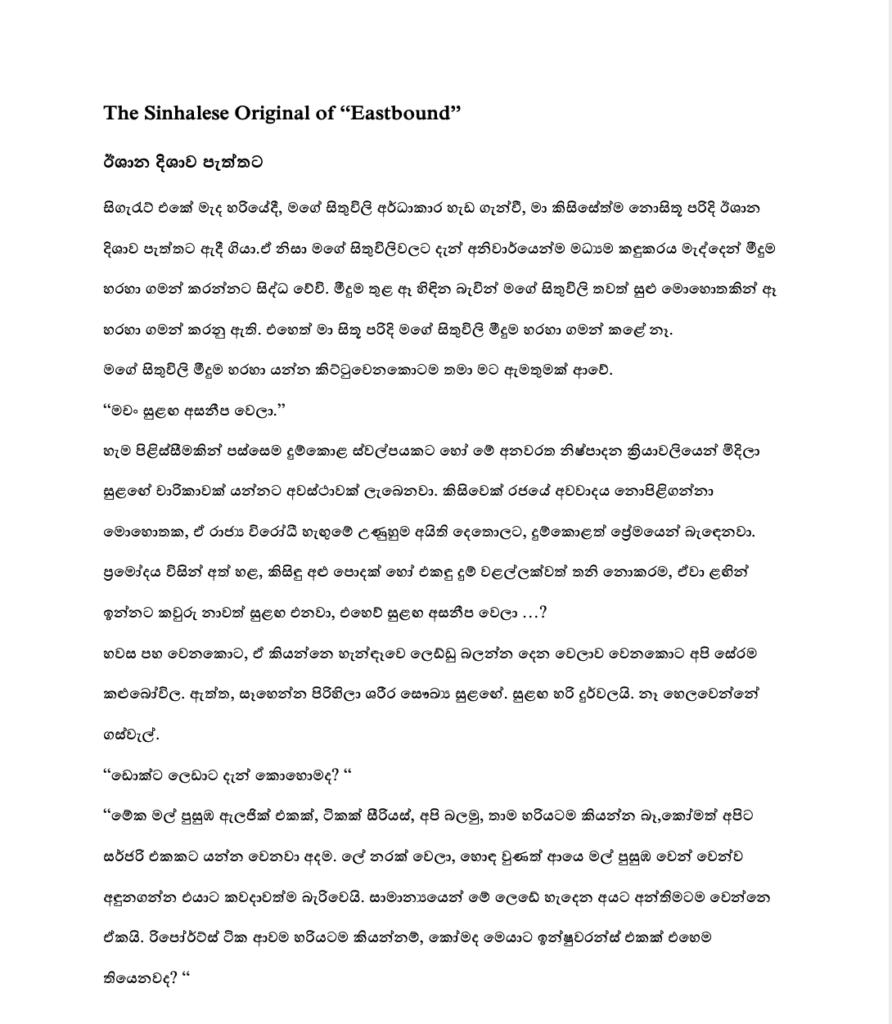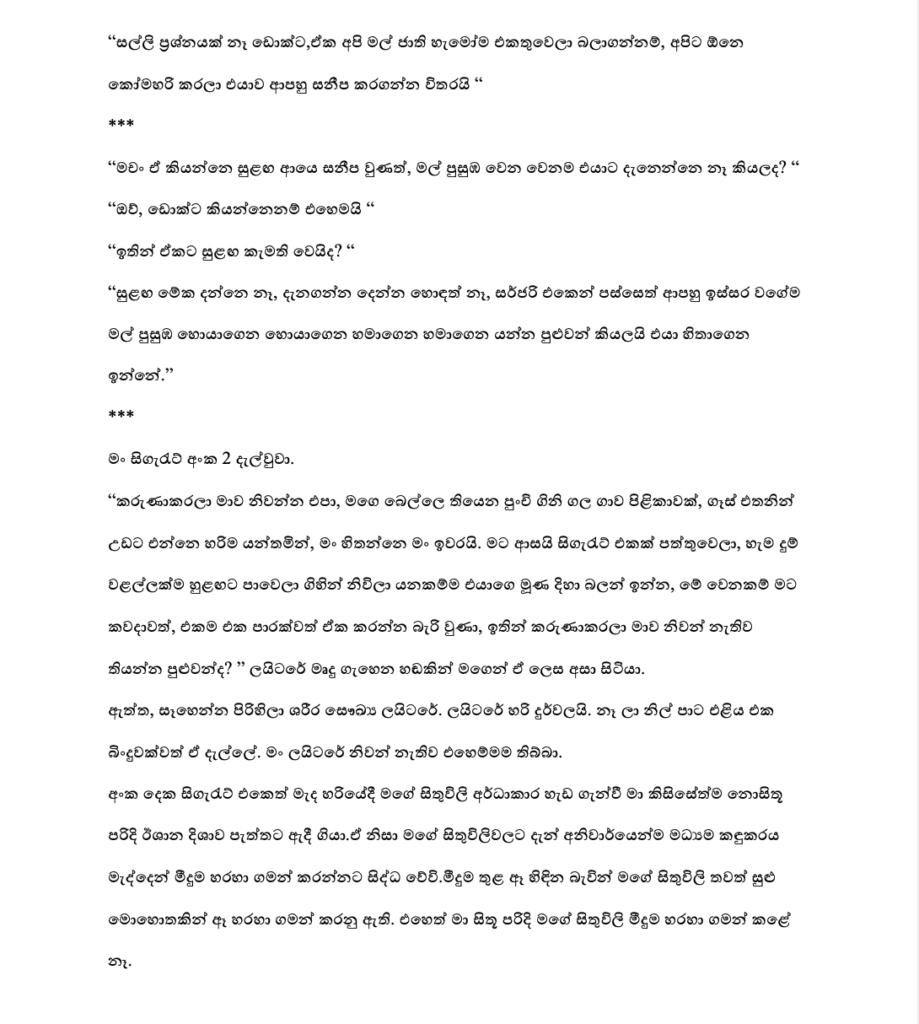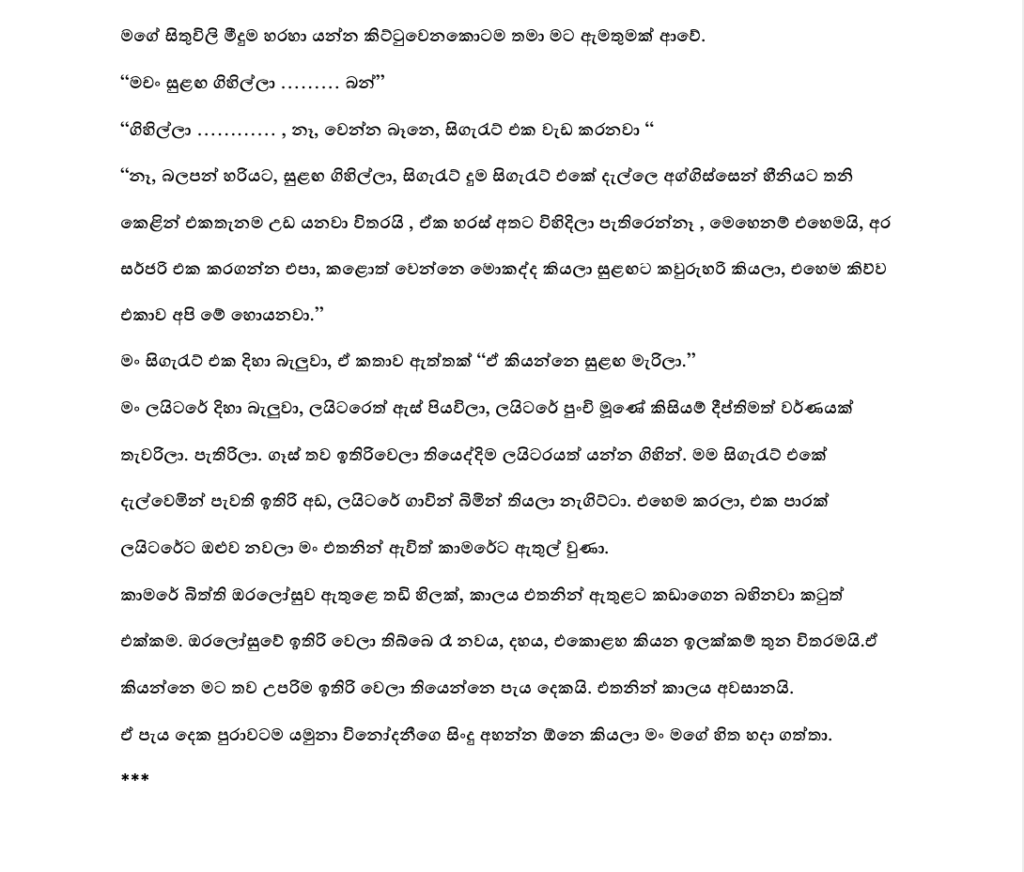
Eastbound by Ruwan Bandujeewa
Translated by Chamini Kulathunga
Toward the middle of the cigarette, my thoughts turned semicircular and started heading eastward, completely defying my expectations. So now, they must travel through the central hills, through the fog. Because she is inside the fog, they will also have to travel through her in a moment. But they did not.
It was when I got a phone call.
“My friend, Wind is sick.”
After every burn, at least a pinch of tobacco gets to wander in the air, free from this unremitting production process. When no one takes the state-regulated health warning seriously, the tobacco falls in love with the lips, the owner of that anarchist warmth. Abandoning not a single speck of ash or a single ring of smoke forsaken by joy, Wind accompanies them when no one else does. How come this dear Wind is now sick?
At five, when visitors are allowed, all of us were at the hospital. True, Wind’s health has declined. Very weak. Not a single leaf moves.
“Doctor, how’s our patient?”
“This is a floral-scent allergy. A bit serious. We can’t assure anything. We are performing surgery today. Its blood is poisoned. Even if it’s cured, it can’t recognize one scent from the other. It’s the nature of this disease. We’ll have to wait for the reports. How about the insurance?”
“Please don’t worry about money, doctor. We flowers will take care of it. All we need is to bring it back to health.”
§
“My friend, so even if it recovers, it cannot tell us by our smell?”
“Yes, that’s what the doctor says.”
“What would Wind say to that?”
“Wind doesn’t know it. We mustn’t let it know either. It thinks it can visit the flowers after the surgery, for their smell like before.”
§
I lit Cigarette No. 2.
“Please don’t put me off. I have cancer in the sparkwheel of my neck. The gas comes from the valve only very slowly. I think I’m finished. I’d like to stare into the face of a cigarette until its every ring of smoke is dissolved in the air, until it is put off by itself. I have never been able to do that, not once. Could you please hold me lit?” Lighter requested me in a soft, quivering voice.
True, Lighter’s health has declined. Very weak. Not a single stroke of blue can be seen in its flame. I let it burn.
Toward the middle of Cigarette No. 2, my thoughts turned semicircular again and started heading eastward, completely defying my expectations. So now, they must travel through the central hills, through the fog. Because she is inside the fog, they will also have to travel through her in a moment. But they did not.
It was when I got a phone call.
“My friend, Wind is…gone.”
“Gone? No, that can’t be true. The cigarette is still burning.”
“No, look carefully. Wind is gone. The smoke is only going straight up from the burning end of the cigarette. It doesn’t swirl in the air, no horizontal movement. At least, that is how it is here. Someone has told Wind not to go through the surgery and its aftermaths. We’re looking for that person.”
I looked at my cigarette, it is true, “So, Wind is dead.”
I looked at Lighter. Its eyes were closed. There was a bright color smeared on its face. It was gone too, even when there was still some gas left. I placed the remaining half of my still burning cigarette on the ground next to Lighter, bowed once, and left for my room.
A big hole inside the clock. Time was gushing into the hole, its hands broken. What was left inside was nine, ten, and eleven. This means I only have two more hours. Soon, Time will be gone, too.
I resolved to listen to Yamuna Vinodani’s songs for the next two hours.



Ruwan Bandujeewa is a contemporary Sri Lankan writer loved by many readers of Sinhalese literature. His best-selling poetry collection, මීළඟ මීවිත (Next Sweet Wines), won the Vidyodaya Literary Award and Godage Literary Award for the best collection of poetry published in 2013, and is now in its sixth print. While his poetry is largely concerned with the often-neglected masses, a subject matter very much intricate to the fabric of Sri Lankan politics —and in a sense, to the world at large—, Bandujeewa’s short fiction is often allegorical and serve as poetic critiques on the nation state and the loopholes in social structures. His writing is marked by a strong sense of place, whether pastoral or urban. Serene, beautiful, honest, and melodic are simply the qualities that are characteristic of Bandujeewa’s language.
Chamini Kulathunga is a translator from Sri Lanka, working with contemporary Sri Lankan Sinhalese literature. She is a graduate of Iowa Translation Workshop. She was a visiting fellow at Cornell University’s South Asia Program in the Summer of 2019 and was the former blog editor and a staff editor in Exchanges: Journal of Literary Translation. Her work has appeared and forthcoming in The Los Angeles Review of Books, The Los Angeles Review, Exchanges, DoubleSpeak, Bengaluru Review and elsewhere.

Chamini have done a commendable job in getting the Sinhalese original to a culturally different audience. I must appreciate her efforts in bring Sri Lankan literature in the limelight.
Hello,
Thanks so much! You can find the reading of the original and translation on the following YouTube links:
Translation: https://www.youtube.com/watch?v=JMkR4hrCoh4&t=21s
Original: https://www.youtube.com/watch?v=dMFyEu51ino&t=2s